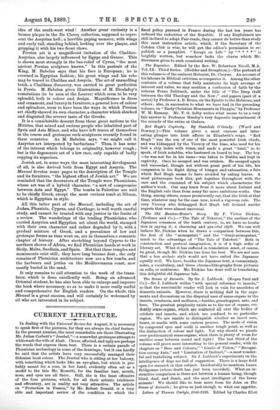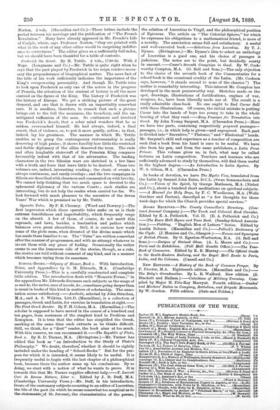The Senses of Animals. By Sir J. Lubbock. (Kegan Paul
and Co.)—Sir J. Lubbock writes "with special reference to insects," so that the unscientific reader will look in vain for anecdotes of domestic animals. however, there is nothing dull in the argu- ments and discussions on the disputed uses of sense-organs in the insects, crustacea, and molluscs,—beetles, grasshoppers, ants, and bees. The greatest perplexity exists as to the use of organs, evi- • dently sense-organs, which are scattered all over the bodies of crickets and insects, and which are confined to no particular region. We are unable to distinguish whether an insect sees, hears, or smells with some curious process. The mode of vision by compound eyes and ocelli is another tough point, as well as the distinction of colour and light. Yet why should we puzzle over problematical sense-organs, when there is plenty of room for another sense between sound and light ? The last third of the volume will prove more interesting to the general reader, with its chapters on " Bees and Colours," " Limits of Vision," "Ree,ogni- tion among Ants," and " Limitation of Instinct,"—a most wonder- ful and tantalising subject. Sir J. Lubbock's experiments on the intelligence of dogs are full of suggestion. There is a large field open for research in that subject. Incidentally he mentions Laura Bridgeman (whose death has just been recorded). What an in- structive comparison is there not between a human being, though blind, deaf, and dumb, and the most intelligent of the lower animals We should like to hear more from Sir John on The Senses of Animals ; he gives us just enough to whet our appetite.
Letters of Thomas Carlyle, 1826-1836. Edited by Charles Eliot
Norton. 2 vols. (Macmillan and Co.)—These letters include the period between his marriage and the publication of " The French Revolution." Many have already appeared in Mr. Froude's Life of Carlyle, where, says Professor Norton, "they are printed with what in the work of any other editor would be surprising indiffer- ence to correctness." The editor gives us a sufficiently full index, but we should have been thankful for a table of contents.



































 Previous page
Previous page